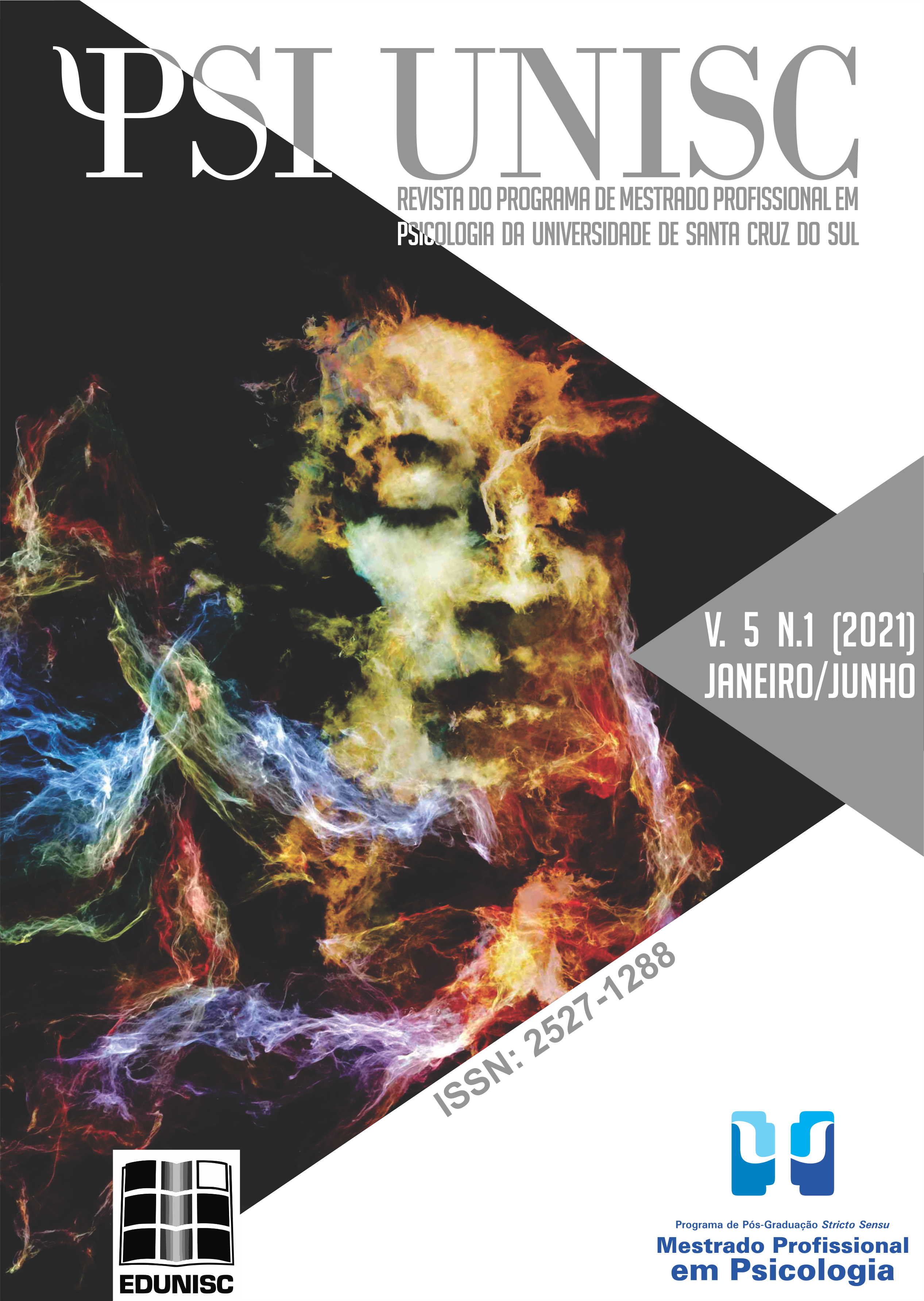Critical view of madness and civilization in Psychology training
DOI:
https://doi.org/10.17058/psiunisc.v5i1.14536Keywords:
Psychology, Higher education, History.Abstract
Especially since Michel Foucault's History of Madness, which explores the ways in which madness is perceived by society from the Middle Ages to Modernity, doors were opened to the discussion of how madness is historically determined. However, it is commonplace to produce prejudice in common sense about what psychic disturbances are or about the concepts of normal and pathological. It is common for students who are newcomers to a Psychology graduation course to bring with them (pre) concepts about the theme, brought from their everyday life. One of the challenges of teaching in psychology is precisely the resignification of such common sense thinking. From this problematic, this paper aims to discuss the importance of reflection on the issue of madness as a historical construction for first semester students of a Psychology course. We conducted a qualitative, exploratory bias research, built from a narrative literature review. From the analysis of the collected bibliographic material, it was possible to infer that exploring the social, cultural and historical constitution of madness allows to put in check the patterns of normality and pathology, blurring the boundaries between such concepts. Exploring madness and its history enables students to understand the mad subject's edification in its subjective effects and historical context. It becomes possible to bring up the discussion that there were times in history when it was unthinkable to consider madness as a pathology. We conclude that this reflection is of fundamental importance for the psychologist's critical and ethical formation, since it allows him to understand madness not as an innate and natural condition, but as constructed and multidetermined.Especially since Michel Foucault's History of Madness, which explores the ways in which madness is perceived by society from the Middle Ages to Modernity, doors were opened to the discussion of how madness is historically determined. However, it is commonplace to produce prejudice in common sense about what psychic disturbances are or about the concepts of normal and pathological. It is common for students who are newcomers to a Psychology graduation course to bring with them (pre) concepts about the theme, brought from their everyday life. One of the challenges of teaching in psychology is precisely the resignification of such common sense thinking. From this problematic, this paper aims to discuss the importance of reflection on the issue of madness as a historical construction for first semester students of a Psychology course. We conducted a qualitative, exploratory bias research, built from a narrative literature review. From the analysis of the collected bibliographic material, it was possible to infer that exploring the social, cultural and historical constitution of madness allows to put in check the patterns of normality and pathology, blurring the boundaries between such concepts. Exploring madness and its history enables students to understand the mad subject's edification in its subjective effects and historical context. It becomes possible to bring up the discussion that there were times in history when it was unthinkable to consider madness as a pathology. We conclude that this reflection is of fundamental importance for the psychologist's critical and ethical formation, since it allows him to understand madness not as an innate and natural condition, but as constructed and multidetermined.Downloads
References
Almeida, F., & Theisen, R. (2009). A psicologia em história da loucura de Michel Foucault. Fractal: Revista de Psicologia, 21(1), 23-42. doi: 10.1590/S1984-02922009000100003
Amarante, P. (1995). Novos sujeitos, novos direitos: o debate em torno da reforma psiquiátrica. Cadernos de Saúde Pública, 11(3), 491-494. doi: 10.1590/S0102-311X1995000300024
Aranha, C., & Cury, L. (2007). Concepção de doença mental em estudantes de graduação em Psicologia: um estudo compreensivo por meio de desenhos temáticos. Mudanças – Psicologia da Saúde, 15 (2), 114-120. doi: 10.15603/2176-1019/mud.v15n2p114-120
Barroso, S. M., & Silva, M. A. (2011). Reforma Psiquiátrica Brasileira: o caminho da desinstitucionalização pelo olhar da historiografia. Revista da SPAGESP - Sociedade de Psicoterapias Analíticas Grupais do Estado de São Paulo, 12(1), 66-78. Recuperado de http://pepsic.bvsalud.org/scielo.php?script=sci_arttext&pid=S167729702011000100008&lng=pt&tlng=pt
Bianchi, R. S., & Padilha, L. M. H. (2011). A construção da subjetividade: notas sobre o sujeito. Acta Scientiarum. Human and Social Sciences, 33(1), 67-74. doi: 10.4025/actascihumansoc.v33i1.9439
Calomeni, T. C. B. (2010). A “secreta fundação” da psiquiatria: considerações sobre a análise foucaultiana da história da loucura. Fractal: Revista de Psicologia, 12(1), 51-66. doi: 10.1590/S1984-02922010000100005
Canguilhem, G. (2009). O normal e o patológico (6. ed. rev.). Rio de Janeiro: Forense Universitária.
Carvalho, A. M. T. & Amarante P. (2000). Forças, diferença e loucura: pensando para além do princípio da clínica. In: P. Amarante (Org.), Ensaios: subjetividade, saúde mental, sociedade (pp.41-52). Rio de Janeiro: Fiocruz.
Cavalheri, S., Merighi, M. A. B., & Jesus, M. C. P. (2007). A constituição dos modos de perceber a loucura por alunos e egressos do Curso de Graduação em Enfermagem: um estudo com o enfoque da Fenomenologia Social. Rev Bras Enferm, 60(1), 9-14. doi: 10.1590/S0034-71672007000100002
Figueiredo, L. C. (2004). Revisitando as psicologias: da epistemologia á ética das práticas e discursos psicológicos. Petrópolis, RJ: Vozes.
Fontes, M. R. M. (2010). A normalização da sociedade: uma questão de poder. Revista Inquietude, Goiânia, 1(1), 41-54. Recuperado de https://sites.google.com/heitorpagliaro.com/revistainquietude/edi%C3%A7%C3%B5es/2010-v-1-n-1
Foucault, M. (1972). História da Loucura. São Paulo, SP: Perspectiva.
Foucault, M. (1998). O nascimento da clínica (5a. ed.). Rio de Janeiro, RJ: Forense Universitária.
Foucault, M. (2003). A vida dos homens infames. In Foucault, M. (2003). Ditos e escritos IV: Estratégia, poder-saber (pp. 203-222). Rio de Janeiro, RJ: Forense Universitária.
Gil, A. C. (2008). Métodos e Técnicas de Pesquisa Social (6a. ed.). São Paulo, SP: Atlas S. A.
Machado, R. (2007). Foucault, a ciência e o saber (3a. ed.). Rio de Janeiro, RJ: Zahar.
Nasi, C., & Schneider, J. F. (2011). O Centro de Atenção Psicossocial no cotidiano dos seus usuários. Rev Esc Enferm USP [online], 45(5), 1157-1163. doi: 10.1590/S0080-62342011000500018
Paty, M. (2003). A ciência e as idas e voltas do senso comum. Scientlae studia, 1(1), 9-26. doi: 10.1590/S1678-31662003000100002
Pelbart, P. P. (1989). A clausura do fora ao fora da clausura: loucura e desrazão. São Paulo, SP: Brasiliense.
Pereira, J. (1984). O que é Loucura. São Paulo, SP: Brasiliense.
Pizzani, L., Silva, R. C., Bello, S. F., & Hayashi, M. C. P. I. (2012). A arte da pesquisa bibliográfica na busca do conhecimento. Rev. Dig. Bibl. Ci. Inf., 10(1), 53-66. doi: 10.20396/rdbci.v10i1.1896
Prado, K. F., & Martins, S. (2007). A subjetividade como objeto da(s) Psicologia(s). Psicologia & Sociedade; 19(3), 14-19. doi: 10.1590/S0102-71822007000300003
Pussetti, C. (2006). A patologização da diversidade: Uma reflexão antropológica sobre a noção de culture-bound syndrome. Etnográfica, 10(1), 5-40. Recuperado de http://www.scielo.mec.pt/scielo.php?script=sci_arttext&pid=S0873-65612006000100001&lng=pt&tlng=pt
Rother, E. (2007). Revisão Sistemática X Revisão Narrativa. Acta paul. enferm., 20(2), 1-2. doi: 10.1590/S0103-21002007000200001
Silva, T. L. G., Brunnet, A. E., Lindern, D., & Pizzinato, A. (2010). O normal e o patológico: contribuições para a discussão sobre o estudo da psicopatologia. Aletheia, 32, 195-197. Recuperado de http://pepsic.bvsalud.org/scielo.php?script=sci_arttext&pid=S1413-03942010000200016&lng=pt&tlng=pt
Soares, L. S., Rodrigues, I. D. C. V., Martins, L. N., Silveira, F. D. R., & Figueiredo, M. L. F. (2013). Revisão de literatura: particularidades de cada tipo de estudo. Rev Enferm UFPI, 2(spe), 14-8. doi: 10.26694/reufpi.v2i5.1200
Souza, J. M. (1998). O senso comum e a vida cotidiana. Tempo soc. [online]. 10(1), 01-08. doi: 10.1590/S0103-20701998000100001
Yasui, S. (2006). Rupturas e encontros: desafios da Reforma Psiquiátrica Brasileira (Tese de doutorado, Escola Nacional de Saúde Pública da Fundação Oswaldo Cruz, Rio de Janeiro). Recuperado de https://www.arca.fiocruz.br/bitstream/icict/4426/2/240.pdf
Downloads
Published
How to Cite
Issue
Section
License
The submission of originals to this journal implies the transfer, by the authors, of the printed and digital publication rights. The copyrights for the published articles are those of the author, with periodical rights on the first publication. Authors may only use the same results in other publications clearly indicating this journal as the medium of the original publication. Because we are an open access journal, we allow free use of articles in educational and scientific applications provided the source is cited under the Creative Commons CC-BY license.




